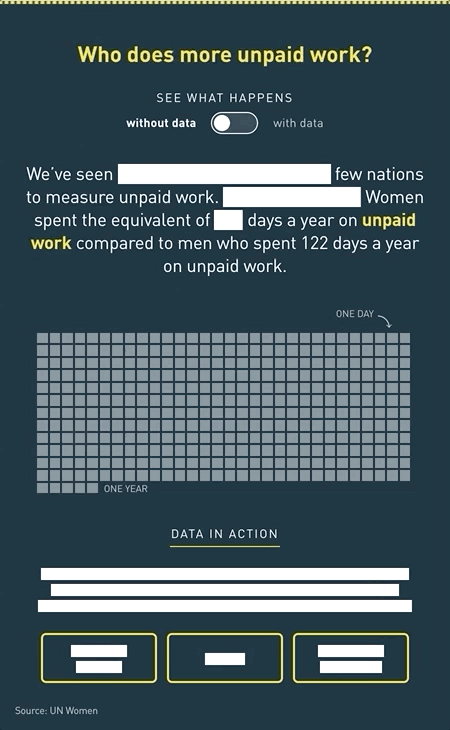
From cooking, cleaning and caring for children and elderly family members, to scheduling doctor’s appointments and parent-teacher meetings, women carry out an unequal share of unpaid care and domestic work. In Canada, women spend 1.5x more time than men on unpaid work, despite more men taking on more household chores and caregiving responsibilities.
The burden of unpaid care work prevents many women from working full time and is proven to limit a woman’s career advancement into senior positions. The bottom line: unpaid care work undermines women’s economic security and is a barrier to gender equality.
Because unpaid care work lacks social recognition and is not tracked in the census it is also largely invisible. A critical step in making invisible work visible is by tracking its societal and economic value and by raising awareness about its impacts.
YWCA Metro Vancouver hosted a panel discussion called The Care Gap: Addressing the Imbalance of Invisible Work, to shed light on this issue.
The panellists were:
Jennifer Berdahl, Professor at the Department of Sociology at UBC;
Bianca Bujan, Parenting Columnist, Travel Writer, Editor, and Marketing Consultant;
Ellen Woodsworth, Founder and Co-Chairperson at Women Transforming Cities;
Glenn Ewald, Director of Communications at Vancouver Foundation.
Here are our main takeaways:
1. Policy is key.
Governments play a critical role in balancing the unpaid work that women are doing. For example, Quebec higher rates of paid parental leave than all the other provinces. As Ellen Woodsworth puts it, “Real affordable child care in Quebec has lifted many people out of poverty. And it’s not just child care we need; we need good, affordable elder care, and different types of housing with care, so we can reduce the amount of unpaid work that mostly women are doing.”
2. Unpaid care work sets women back from advancing in their careers.
Jennifer Berdahl says unpaid care isn’t just causing women to drop out of their careers since many women aren’t in a position to leave. Forty one percent of women are the primary breadwinners in their households and 23% are co-breadwinners. The disproportionate burden of unpaid care has a direct negative impact on their ability to advance in their careers, leading to gender gaps in employment outcomes and wages. While women lose earnings after having kids, fathers’ income tends to rise. Jennifer also pointed out that companies and organizations are still structured around the antiquated idea that men are breadwinners and women are homemakers.
3. Employers should work collaboratively with their employees to provide more flexible work arrangements.
In her work, Jennifer Berdahl has seen an issue called “The Flexibility Stigma,” where some organizations claim they provide a flexible work environment for parents, but in reality, they frown upon employees who request it. Organizations should prioritize results rather than facetime and work out schedules that benefit employees and their families.
4. We all need to talk about unpaid care more.
Whether that’s at work, at home or with our friends, the more we talk about it, the more we can understand why it is happening, what we need to change and the steps we can take to address the imbalance of invisible work. Glenn and Bianca both emphasize prioritizing communication between partners, empowering one another while being accountable to each other and recognizing that relationships and needs shift over time and partners may need to renegotiate unpaid care.
We believe unpaid care work must be valued as much as paid work, and shared equally between women and men*.
*We acknowledge that this issue is frequently viewed through a heteronormative lens with assumptions that there is an adult man and an adult woman in the family mix. We want to recognize that socioeconomic status, gender identity, orientation, race and other factors also play a role in the unequal distribution of caregiving work.
Want to do more?
Use your voice
Public opinion shapes public policy. Contact your elected official to support the inclusion of unpaid work by gender in the census. By gathering this information we can develop statistical standards, evaluate data and recommend policy changes.
Not sure who your MP is? Check out this list for information on your federal legislative representative.

(Source: Bill and Melinda Gates Foundation, 2019)
Get informed and learn more
Get informed and use your social networks to bring awareness to decision makers, media and your friends. Here are some resources on unpaid care that you may want to read:
-
The power of parity: Advancing women’s equality in Canada
McKinsey Global Institute, June 2017 Report -
State Of The World's Fathers: Unlocking the Power of Men’s Care
Promundo, 2019 Report
The world’s only global report on men’s involvement in parenting and care work. - Close the Gap - Factsheets from Federal Pay Equity Network
Factsheet 1 - Facts and Figures about the Gender Pay Gap
Factsheet 2 - What Causes the Gender Pay Gap?
Factsheet 3 - The Difference between Equal Pay and Pay Equity
Factsheet 4 - A Spotlight on Transparency
Child Care and the Gender Wage Gap
Connect with us
Join our advocacy list. Follow our blog, Facebook, Twitter or Instagram to engage in conversations about issues like unpaid care.
Support our work
YWCA Metro Vancouver has worked towards our vision of achieving women’s equality for more than a century. Our programs and services address the needs of families across our region and our advocacy work aims to address the root causes of social inequality.
Support our advocacy work, give to the YWCA to address systemic gaps affecting single moms and families.

